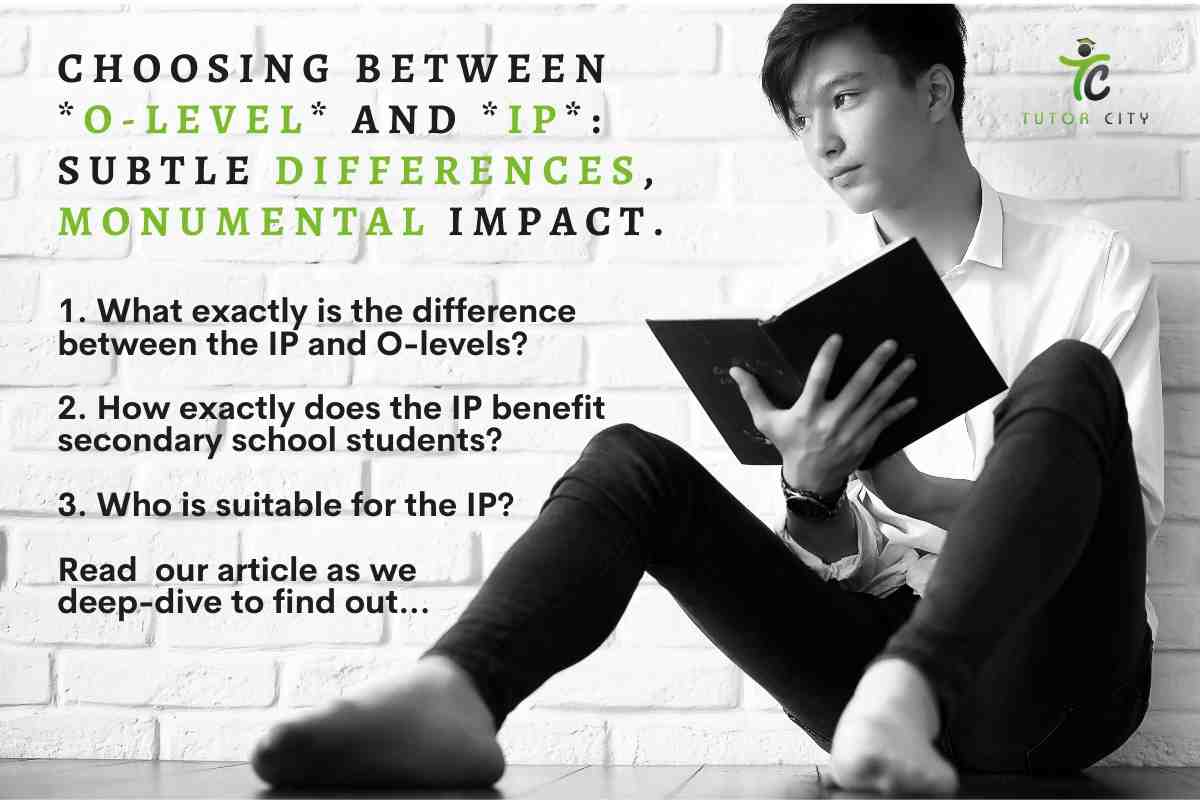
- Published by: Tutor City
- June 30, 2020
- Education
Choosing between O-level and IP: Subtle Differences, Monumental Impact
Every year thousands of secondary school students in Singapore take O-level (Singapore-Cambridge General Certificate of Education Ordinary Level) exams or enroll into IP (The Integrated Programme).
Both of these enable the students to qualify for A-level (GCE Advanced level) exams.
O-levels are well-known among the secondary school students as they have existed for many years.
On the other hand the IP is a more recent phenomenon and only those students that are top of their class are eligible for it.
Once your child successfully finishes primary school you can enroll them into the Integrated Programme which is a straightforward path towards A-level exams.
However one must keep in mind that the IP is not suitable for everyone.
The choice you make between enrolling your child into IP or letting them take the path that leads to O-levels may have a monumental impact on their future success.
1. So what exactly is the difference between the IP and O-levels?
The Integrated Programme was first introduced by the Ministry of Education in 2004 and is offered by selected schools in Singapore that aim to provide secondary education at the highest level.
The programme lasts for 6 years and, as it has already been mentioned, it allows gifted students to avoid O-levels and have a go at the International Baccalaureate or A-level exams directly.
The programme is targeted at around top 10 % of those students that take PSLE exams.
The IP curriculum is broader and more flexible than that of the O-levels and it enables the students to develop various skills and talents as well as satisfy their intellectual curiosity.
Unlike the IP curriculum the O-level curriculum takes 4 or 5 years to complete (the Express Stream and the Normal Academic Stream respectively).
If we had to highlight the main difference between these two it would be the fact that the IP enables the students to skip the O-level exams and take the exams that will enable them to gain entry to university straightaway.
It is not hard to see how that may be beneficial for students. One less exam means less stress and more time to devote to the preparation for the exam that matters the most: the exam that will grant you access to your dream university.
2. How exactly does the IP benefit secondary school students?
The time students save by not worrying about passing their O-levels they can devote to expanding their knowledge in both academic and non-academic ways. The IP students are usually academically ahead of their peers.
They enhance their logical skills by discussing more complex topics, and in general gain more knowledge by studying higher-level subjects.
And since the IP students don’t have to cram for O-level exams they have more time left over to get involved in enrichment programmes and develop essential soft skills (such as critical thinking, communication skills, problem solving skills etc.) which will help them become highly-functioning members of society.
One more thing IP students can do with their extra time is get involved in the extracurricular activities and programmes that benefit the local community.
Such activities help students develop vital personal characteristics (e.g. sense of responsibility and empathy). Other extracurricular activities a child might get involved in include sports and arts, which will make their school years not only educational but also very enjoyable.
Nowadays children are under immense pressure to achieve academic success which may lead to high levels of anxiety among teens. Having those brief moments of being immersed in their favorite activity will provide a welcome respite.
3. Who is suitable for the IP?
As it has been written above only top 10 % of those students who have passed their PSLE exams are accepted into the IP. So the first stage of the selection process is present in the form of academic scores.
Not being in the top 10 % indicates that a student is not ready to handle the complexity of the IP curriculum. However, even if your child qualifies from the academic point of view you might still want to think long and hard before deciding to enroll them into the IP.
Knowing your child’s study habits is crucial before deciding to enroll them into the programme as he/she will only succeed if they make an effort and commit fully to the complex IP curriculum.
Adapting to the style of learning is as important as getting the hang of the pace of learning. Otherwise the student may find that they struggle to cope and leave the programme before they complete it.
This is an appropriate programme for those children who have a high degree of self-discipline and can be trusted to perform their duties diligently, and in addition possess the ability to adapt swiftly to new circumstances.
If your child doesn’t have what it takes to handle the rigorous IP curriculum, enrolling them in the O-level programme is a better option.
What’s more some schools provide both programmes and allow students to switch from one to the other.
To conclude, successfully completing both IP and O-levels will enable your child to take A-level exams which in turn will grant them access to university.
Although the IP is much more selective in the enrollment process not all students can keep up with the complexities of the curriculum and O-level route still is a very popular choice for secondary school students.






